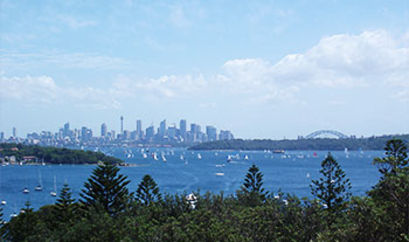- Funding opportunities
- Political framework
- Priorities of the cooperation
- Highlights of the bilateral cooperation
- Successful university collaboration
- The role of the International Bureau
- Information about other funding programmes
Funding opportunities
Applications can only be submitted during certain periods following a prior funding announcement. These announcements are published at irregular intervals.
Political framework
The historic importance of the contacts with Europe to the Australian education and research landscape led to Australia being the first country to sign a Science and Technology Agreement with the European Union in 1994. The German-Australian cooperation dates back to an intergovernmental agreement signed in 1976.
In addition, there is a cooperation agreement on education between the Alexander von Humboldt Foundation (AvH) and the Australian Research Council (ARC). Other agreements are in place between the German Research Foundation (DFG) and the Australian Research Council (ARC) and the Australian National Health and Medical Research Council (NHMRC).
Priorities of the cooperation
- Scientific and technological cooperation with Australia encompasses three complementary areas:
- Exchange of students and young scientists via the German Academic Exchange Service (DAAD), the Alexander von Humboldt Foundation (AvH) and the German Research Community (DFG), which serves as a basis for projects and long-term cooperation.
- 'Mobility projects' run by the German Academic Exchange Service DAAD ('project-based person exchange programmes', PPP) are meant to initiate and prepare joint research projects: workshops, conferences and reciprocal visits by expert delegations.
- Establishment of joint research infrastructures and 'Travelling Conferences' to explore excellent research networks (German Federal Ministry of Education and Research (BMBF) via the International Bureau).
The cooperation currently focuses on the following fields:
- Renewable energy, especially hydrogen research
- Health research
- Environmental research and technologies
- Geo, Marine and Antarctic research
A particular focus is on giving support to young scientists.
Highlights of the bilateral cooperation
In December 2018, a delegation led by the German Federal Ministry of Education and Research (BMBF) travelled to Australia to hold talks on the future design of the science and technology cooperation. On the last Australia-Germany Science and Technology Joint Commission Meeting (JCM) in November 2020 both sides confirmed energy research, especially green hydrogen, as an important topic of cooperation.
Successful university collaboration
One important element of the German-Australian partnership is cooperation between universities. According to the 'Higher Education Compass' published by the German Rectors’ Conference (HRK), there are currently 578 collaboration agreements in place between German and Australian universities (as of February 2022). Within the Asia-Pacific region, the only countries that have even more cooperation agreements with German universities are China and Japan.
The most important tool in bilateral university collaboration is the exchange of students and researchers, primarily funded by the German Academic Exchange Service (DAAD). The DAAD has been able to extend its exchange programme with the Group of Eight, the eight most important Australian universities. This programme was launched in 2008 and has since then been rolled out to more than 30 of the 39 Australian universities, thanks to an agreement with 'Universities Australia', the umbrella organisation of Australian universities, which was signed in December 2014.
Australian scientists are among the most successful applicants for the programmes of the Alexander von Humboldt Foundation. The Humboldt network in Australia comprises approx. 580 alumni.
Flagship projects funded by the German Research Association (DFG) are the four international research training groups (ITRG) with Australia:
- GRK 1871 – 'Molecular Pathogenesis of Male Reproductive Disorders' between Giessen University and Monash University
- GRK 2168 – 'Myeloid antigen presenting cells and the induction of adaptive immunity' between University of Bonn and University of Melbourne
- GRK 2290 'Overcoming borders: Molecular interactions in Malaria' between Humboldt University Berlin and Australian National University
- GRK 2675 'Tailored metasurfaces – generating, programming and detecting light' between Friedrich-Schiller University Jena and Australian National University (since January 2022)
The Federal Ministry of Education and Research (BMBF) provides funds for exploration and networking activities through its directorate general for international cooperation. In 2016, the largest number of applications in response to the call 'Establishment of Joint Research Presences in Asia-Pacific' targeted Australia. Three projects are currently being funded (until 2023):
- BM-AXIS – 'Bonn Melbourne Academy for eXcellence in ImmunoSciences/Infectiology' between University of Bonn and University of Melbourne
- Gabi – 'German-Australian Joint Lab on Health-Related Water Microbiology' between DVGW Technology Center Water in Karlsruhe and CSIRO Land & Water Flagship in Brisbane
- ZENITH – 'German-Australian Center for Electrochemical Energy Storage for Renewable Energies' between Fraunhofer ICT (Chemical Technologies) and University of New South Wales in Sydney
Australia is an important international partner with regard to Germany’s National Hydrogen Strategy. Within the framework of the call 'Establishment of Joint Research Presences on Green Hydrogen with partners in Asia-Pacific' (2020), two projects have started at the beginning of 2022. The projects are planned for five years (three years set-up phase followed by a two-year consolidation phase).
- ADELE: RWTH Aachen University and University of Melbourne are establishing a Joint Laboratory to research efficient electrochemical processes for production and use of green hydrogen
- E-Ammonia-Lab: TU Berlin and Monash University are setting up a German-Australian Lab to produce and store green hydrogen using electrochemical direct reduction of atmospheric nitrogen
These two Joint Research Presences should become sustainable 'hubs' for green hydrogen technologies in Australia and thus improve the access of Germany’s research community and industry to the partner country Australia and the Asia-Pacific region.
The role of the International Bureau
The International Bureau currently supports the bilateral cooperation with Australia in particular through the projects funded within the BMBF’s Funding Programme to establish joint research centres with partners in the Asia-Pacific Research Area (APRA).








